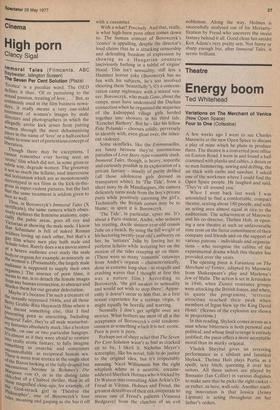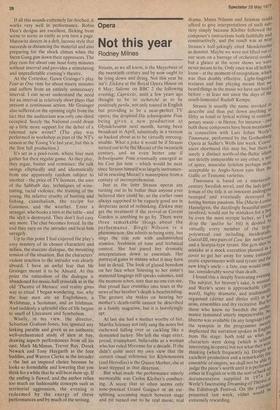Theatre
Energy boom
Ted Whitehead
Variations on The Merchant of Venice (New Open Space)
Four to One (Cottesloe)
A few weeks ago I went to see Charles • Marowitz at the new Open Space to discuss a play of mine which he plans to produce there. The theatre is a converted post office on Euston Road. I went in and found a hall crammed with planks and cables, a dozen or so men hammering, sawing and drilling, the air thick with oaths and sawdust. I asked one of the workmen where I could find the Open Space people. He laughed and said, 'They're all around you.'
When I went back last week I was astonished to find a comfortable, compact theatre, seating about 180 people, and with an acting area almost equal in size to the auditorium. The achievement of Marowitz and his co-director, Thelma Holt, in opening a new theatre at such an unfavourable time rests on the fierce commitment of their company and friends and on the support of various patrons — individuals and organisations — who recognise the calibre of the experimental drama which this theatre has provided over the years.
The opening piece is Variations on The Merchant of Venice, adapted by Marowitz from Shakespeare's play and Marlowe's Jew of Malta. The action is set in Jerusalem in 1946, when Zionist resistance groups were attacking the British forces, and when, to quote the programme, 'terrorist atrocities reached their peak when members of Irgun blew up the King David Hotel.' (Scenes of the explosion are shown in projections.)
In this reading, Shylock comes across as a man whose bitterness is both personal and political, and whose final revenge is entirely justified; the piece offers a more acceptable moral than its murky original.
Vladek Sheybal gives an arresting performance as a sibilant and fanatical Shylock. Thelma Holt plays Portia as a spoilt, sexy bitch, queening it over her suitors. All three suitors are played by Bassanio (Ian Collier) in various disguises to make sure that he picks the right casket — or rather, as here, wall-safe. Another startl ing innovation is that Jessica (Jenny Lipman) is acting throughout on her father's orders. If all this sounds extremely far-fetched, it works very well in performance. Robin Don's designs are excellent, flicking from scene to scene as easily as you turn a page. Marowitz directs in a deft, laconic style that succeeds in distancing the material and also preparing for the shock climax when the Stern Gang gun down their oppressors. The play runs for about one hour forty minutes without interval and provides a stimulating and unpredictable evening's theatre.
At the Cottesloe, Gawn Grainger's play Four to One runs for about ninety minutes and suffers from an entirely unnecessary interval. 'I can never understand the need for an interval in relatively short plays that present a continuous action. Mr Grainger also suffered on the opening night from the fact that the auditorium was only one-third occupied. Surely the National could drum up a little more support for the debut of a talented new writer? (The play was performed in workshop as part of the NT's season at the Young Vic last year, but this is the first full production.) It's set in a pool-room, where four men gather for their regular game. As they play, they argue, banter and reminisce; the talk swings elliptically and and idiomatically from one apparently random subject to another — the price of TV licences, the uses of the Sabbath day, techniques of winetasting, racial violence, the training of the young, the relative cruelty of hunting and fishing, cannibalism, the recipe for Guinness, and the weather. Enter a stranger, who books a turn at the table —and the idyll is destroyed. They don't feel easy any more. The chat becomes forced. In the end they turn on the intruder and beat him savagely.
Up to this point I had enjoyed the play's easy mastery of its chosen characters and milieu, the staccato dialogue, the mounting tension of the situation. But the characters' violent reaction to the intruder was clearly absurd. I have an awful fear that . Mr Grainger meant it to be Absurd. At this point the naturalism of the dialogue is abandoned for music-hall crosstalk as in the old 'Theatre of Menace' and reality gives way to ritual. I began wondering, too, why the four men are an Englishmen, a Welshman, a Scotsman, and an Irishman. And suddenly a splendid slice of life begins to smell of Literature and Symbolism.
Wisely, in my view, the director, Sebastian Graham-Jones, has, ignored any lurking parable and given us an authentic well-orchestrated study of men at bay, drawing superb performances from all his cast: Mark McManus, Trevor Ray, Derek Newark and Tony Haygarth as the four buddies, and Warren Clarke as the intruder — the last an inspired choice because he looks so formidable and lowering that you think for a while that he will beat them up. If the ending is flawed, and the author relies too much on fashionable concepts such as territorial aggression, the evening is redeemed by the energy of these performances and by much of the writing.



































 Previous page
Previous page